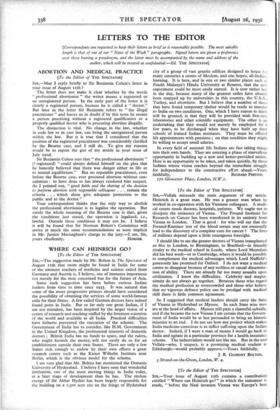ABORTION AND MEDICAL PRACTICE
LETTERS TO THE EDITOR
[Correspondents are requested to keep their letters as brief as is reasonably possible. The most suitable length is that of one of our " News of the Week" paragraphs. Signed letters are given a preference over those bearing a pseudonym, and the latter must be accompanied by the name and address of the author, which will be treated as confidential.—Ed. THE SPECTATOR] [To the Editor of THE SPECTATOR] SIR,—May I reply briefly to Sir Benjamin Cohen's letter in your issue of August 12th ?
The letter does not make it clear whether by the words professional abortionist " the writer means a registered or an unregistered person. In the early part of the letter it is clearly a registered person, because he is called a " doctor." But later in the letter Sir Benjamin refers to " the illegal practitioner " and leaves us in doubt if by this term he means a person practising without a registered qualification or a properly qualified doctor who is procuring abortion illegally.
The distinction is vital. No change in the law, whether in code law or in case law, can bring the unregistered person within the law. But it is true that I considered that the position of the registered practitioner was considerably clarified by the Bourne case, and I still do. To give my reasons would be to repeat the gist of my article in your issue of July 22nd.
Sir Benjamin Cohen says that " the professional abortionist " (? registered) " could always defend himself on the plea that he honestly believed that there was danger either to life or to mental equilibrium." But no reputable practitioner, even before the Bourne case, ever procured abortion without con- sultation : to have done so has always rendered him suspect. As I pointed out, " good faith and the sharing of the decision to perform abortion with responsible colleagues . . . remain the criteria . . . which alone give adequate protection to the public and to the doctor."
Your correspondent thinks that the only way to abolish the professional abortionist is to legalise the operation. But surely the whole meaning of the Bourne case is that, given the conditions just stated, the operation is legalised, i.e., lawful. Outside these conditions it may not be. I believe it will be found that Sir Norman Birkett's Committee will arrive at much the same recommendations as were implicit in Mr. Justice Macnaghten's charge to the jury.—I am, Sir,


































 Previous page
Previous page